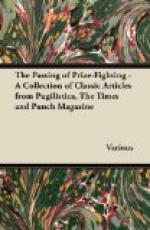Q. How was that?
A. For instance, les tricoteuses were
represented by comely,
albeit plump maidens, who seemed more
inclined to dance round a
Maypole than haunt a scaffold.
Q. Were ROBESPIERRE, ST. JUST, and the rest, cruel and vindictive?
A. I should say not; and I found my conclusion
on the fact that they
engaged an actor given to practical joking
as an officer of the Public
Security.
Q. From this, do you take it that ROBESPIERRE must have had a subtle sense of humour?
A. I do; and the impression is strengthened
by his order for a
general slaughter of Ursuline Nuns.
Q. Why should he order such a massacre?
A. To catch the heroine of Thermidor,
a lady who had taken the
vows under the impression that her lover
had been killed by the enemy.
Q. Had her lover been killed?
A. Certainly not; he had preferred to surrender.
Q. Can you give me any idea of the component
part of a revolutionary
crowd?
A. At the Opera Comique, a revolutionary crowd
seems to consist of
a number of mournful loungers, who have
nothing to do save to take
a languid interest in the fate of a tearful
maiden, and a few gens
d’armes a little uncertain about
their parade-ground.
Q. How do the mournful loungers express their
interest in the fate
of the tearful maiden?
A. By pointing her out one to another, and
when she is ordered off
to execution removing their hats, and
fixing I their attention on
something concealed behind the scenes.
Q. What is your present idea of the Reign of Terror?
A. My present idea of the Reign of Terror is,
that it was the
mildest thing imaginable. In my opinion,
not even a child in arms
would have been frightened at it.
Q. Do you not consider M. MAYER deserving of honour?
A. Certainly I do. For has he not removed
(with the assistance of M.
SARDOU and the Opera Comique) several
fond illusions of my youth?
* * * * *
[Illustration: NATURE V. ART.
AEsthetic Friend. “YES, THIS ROOM’S RATHER NICE, ALL BUT THE WINDOW, WITH THESE LARGE BLANK PANES OF PLATE-GLASS! I SHOULD LIKE TO SEE SOME SORT OF PATTERN ON THEM—LITTLE SQUARES OR LOZENGES OR ARABESQUES—”
Philistine. “WELL, BUT THOSE LOVELY CHERRY BLOSSOMS, AND THE LAKE, AND THE DISTANT MOUNTAIN, AND THE BEAUTIFUL SUNSETS, AND THE PURPLE CLOUDS—ISN’T THAT PATTERN ENOUGH?”]
* * * * *
THE MORNING OF THE DERBY.—Hamlet considering whether he shall go to Epsom for the great race or not, soliloquises, “Der-be or not Der-be, that is the question.” [N.B.—As to the other lines, go as you please. “The rest is silence.”]




